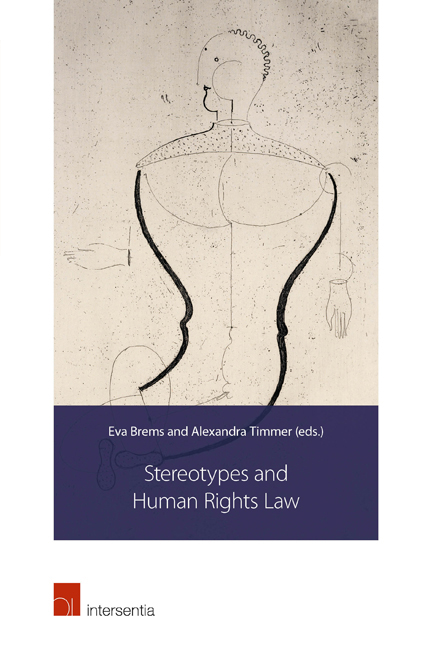Book contents
- Frontmatter
- Contents
- Introduction
- Building Momentum Towards Change. How the UN's Response to Stereotyping is Evolving
- Gender Stereotyping in Domestic Violence Cases. An Analysis of the European Court of Human Rights’ Jurisprudence
- Gender Stereotyping in the Case Law of the Inter‑American Court of Human Rights
- ‘My Sense of Humanity Has Gone Down the Drain’. Stereotypes, Stigma and Sanism
- Racial Stereotypes and Human Rights
- The Head of the Woman is the Man. The Failure to Address Gender Stereotypes in the Legal Procedures around the Dutch SGP
- Gender Stereotyping in the Military. Insights From Court Cases
The Head of the Woman is the Man. The Failure to Address Gender Stereotypes in the Legal Procedures around the Dutch SGP
Published online by Cambridge University Press: 22 December 2017
- Frontmatter
- Contents
- Introduction
- Building Momentum Towards Change. How the UN's Response to Stereotyping is Evolving
- Gender Stereotyping in Domestic Violence Cases. An Analysis of the European Court of Human Rights’ Jurisprudence
- Gender Stereotyping in the Case Law of the Inter‑American Court of Human Rights
- ‘My Sense of Humanity Has Gone Down the Drain’. Stereotypes, Stigma and Sanism
- Racial Stereotypes and Human Rights
- The Head of the Woman is the Man. The Failure to Address Gender Stereotypes in the Legal Procedures around the Dutch SGP
- Gender Stereotyping in the Military. Insights From Court Cases
Summary
The theme of this volume, eradicating harmful stereotypes with the help of law, goes to the heart of my academic work in the past two decades. The stubbornness and the detrimental effects of gender stereotypes inspired me to search for legal norms that are available and appropriate to tackle such stereotypes. I have written extensively on this issue, in particular in relation to Article 5(a) of the Convention on the Elimination of all Forms of Discrimination Against Women (CEDAW). The first part of this provision entails the obligation of States Parties to effectively put an end to prejudices and all customs and practices which are based on the idea of the inferiority or the superiority of either of the sexes or on stereotyped roles for men and women. In the second part, States Parties are encouraged to promote a different (than traditional) understanding of the parental roles of men and women. According to the Committee of experts that supervises the implementation of CEDAW, gender stereotypes and fixed parental gender roles are root causes of discrimination against women. The elimination of all forms of discrimination against women is impossible without eradicating these causes. The Committee uses various terms to express this concern. For example, it states that stereotypes are ‘adverse cultural norms’, that they ‘constitute barriers’, and that they form ‘the most serious obstacles’, or ‘are a root cause of the disadvantaged position of women’. Sometimes the Committee considers stereotypes to be discriminatory perse. In its Concluding Observations on Burundi in 2008, the Committee adopted both approaches in one comment.
It is certainly positive that the CEDAW Committee has systematically stressed the discriminatory nature of gender stereotypes, and that this insight has also been accepted elsewhere in international law, as well as in case law of for example the Supreme Court of the United States. However, this does not mean that gender stereotypes are always recognised and revealed by the parties in legal procedures in which a violation of women's human rights is at stake, or by the judges that adjudicate such cases. Recognition of stereotyping is often also lacking in legal procedures that revolve around women's right to equality or nondiscrimination.
- Type
- Chapter
- Information
- Stereotypes and Human Rights Law , pp. 143 - 174Publisher: IntersentiaPrint publication year: 2016



